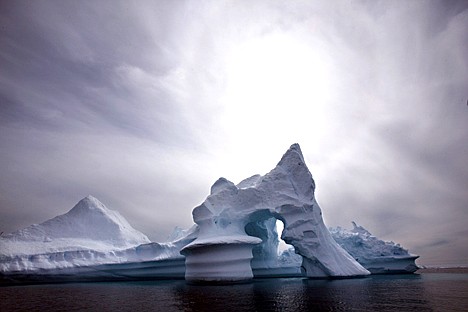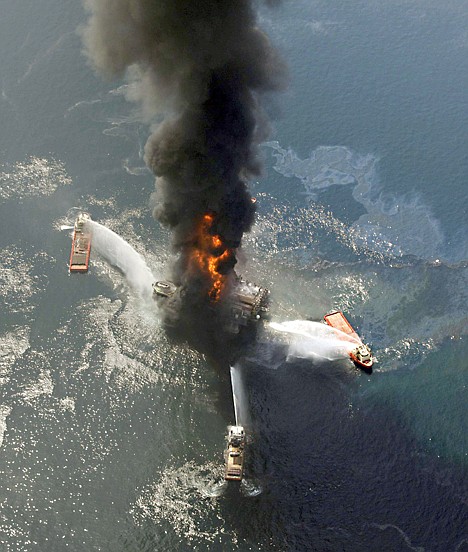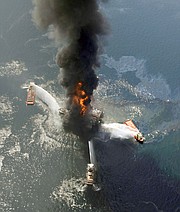World's thirst for oil leads to risks
Harry R. Weber | Hagadone News Network | UPDATED 15 years, 3 months AGO
MIAMI - The world's thirst for crude is leading oil exploration companies into ever deeper waters and ventures fraught with environmental and political peril.
The days when the industry could merely drill on land and wait for the oil - and the profits - to flow are coming to an end. Because of that, companies feel compelled to sink wells at the bottom of deep oceans, inject chemicals into the ground to force oil to the surface, deal with unsavory regimes, or operate in some of the world's most environmentally sensitive and inaccessible spots, far from ports and decent roads. All those factors could make it difficult to move in equipment and clean up a spill.
From the Arctic to Cuba to the coast of Nigeria, avoiding catastrophes like BP's Gulf of Mexico spill is likely to become increasingly difficult and require cooperation among countries that aren't used to working together.
An Associated Press review of oil ventures around the world found plans to punch through layers of salt more than three miles beneath the ocean floor off the coast of Brazil, drill seven exploratory wells off Cuba and extract oil from crude-soaked sands on the Canadian prairie. Drilling is proceeding in countries with extremely weak regulations and a lack of skilled operators, and in geological settings much like the northern Gulf of Mexico, with high pressure and weak rock formations ripe for blowouts.
Companies are seeking the new frontiers amid warnings from some analysts that worldwide oil production will peak and then decline as onshore wells dry up. It's not that oil itself is scarce - global reserves are estimated at 1.2 trillion barrels - but getting to it requires large investments in treacherous places.
"It's just getting harder to find this stuff. You're having to go to the end of the Earth or the bottoms of very deep oceans now," said Randy Udall, director of the nonprofit Community Office for Resource Efficiency in Aspen, Colo.
BP CEO Bob Dudley argued last week that deep-water drilling is necessary despite the dangers because the world could be consuming 40 percent more energy by 2030.
BP and other major oil companies say they are preparing for the risks and trying to find common solutions. Also, the International Association of Oil and Gas Producers, a trade group, is talking with other industry organizations in the U.S., Australia, Brazil and Britain about preventing and responding to disasters, said executive director Michael Engell-Jensen.
But so far, little has been done globally to come up with a universally accepted set of standards and response procedures. Diplomatic tensions could prevent effective cooperation among countries, and some projects already under way - such as a deep-water containment system that U.S. oil companies are building in the Gulf - are meant only for a particular area.
In the meantime, the industry is pursuing some audacious projects.
Exploration companies have discovered huge oil fields in the South Atlantic off Brazil, with deposits believed to exceed 8 billion barrels. Reaching them will require drilling not only in waters nearly two miles deep, but through salt layers up to three miles below the ocean floor. The BP well that blew out was in water a mile deep.
The U.S. Geological Survey estimates the Arctic region holds up to one-quarter of the world's undiscovered conventional oil and natural gas, including 90 billion barrels of crude - most of it offshore. Companies in the U.S., Russia, Norway, Denmark and Canada are stepping up preparations to drill there.
Environmental groups have sued to prevent it. Cold and ice would hamper cleanup of a spill, they say, by making it hard to get people and equipment to the scene. And the region lacks the sunlight and abundance of microbes that are helping break down the oil in the Gulf. A major spill could injure or kill whales, polar bears, seals, walruses and many types of fish.
Shell Oil, which plans to drill exploratory wells off Alaska, will have a response fleet constantly on hand with helicopters, boom, skimmers and other equipment for dealing with spills. "In the unlikely event of a discharge, they would be deployed and recovering oil within an hour," spokesman Curtis Smith said.
In the western U.S., companies are targeting what the Energy Department says are billions of barrels of recoverable oil trapped within deposits of shale rock, which is composed of layers of claylike, fine-grain sediments. Mining and processing shale oil are a big source of greenhouse gas emissions. Environmentalists also worry about the huge volumes of water and chemicals pumped deep underground at high pressures to break loose the shale.
Similar issues have arisen in the Canadian province of Alberta, where companies are extracting sticky black bitumen oil from mixtures of sand and clay known as tar sands - a process that consumes vast quantities of water in an arid climate.
In Nigeria, where major oil companies like Royal Dutch Shell and others explore the oil-rich Niger Delta, regulators ostensibly demand adherence to international standards. But enforcement is another matter in a country with a reputation for some of the worst corruption in the world.
Uneven environmental standards are a big concern in developing countries such as Nigeria, Angola and Kazakhstan - places where "a major spill would be an absolute nightmare to manage, politically and logistically," said Matthew Halle, a recruiting manager at the energy consulting firm NES Inc.
ARTICLES BY HARRY R. WEBER

BP settles Gulf spill lawsuits for at least $7.8B

Wrestler known as 'Macho Man' dies in Florida wreck
'Medical event' may have occurred prior to accident
Randy "Macho Man" Savage, the professional wrestler known for his raspy voice, the sunglasses and bandanas he wore in the ring and the young woman named Miss Elizabeth who often accompanied him, died in a car crash Friday in Florida. He was 58.

One year later: BP looking strong
NEW ORLEANS - It's hard to tell that just a year ago BP was reeling from financial havoc and an American public out for blood.



